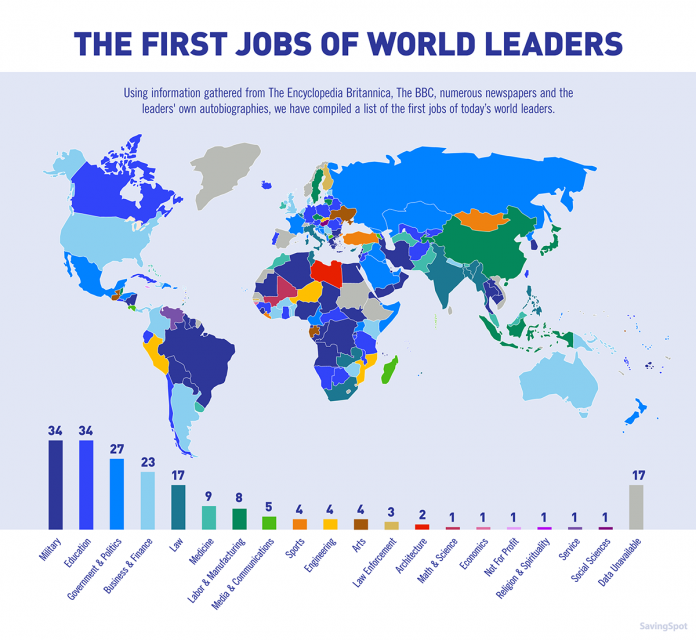Starting your own business is a massive step, and you should feel rightly proud for every day you keep it afloat. But great leaders never forget where they came from.
Some of the most important lessons in business and in people management may come from the grunt work of teenage Saturday job you once held, or the modest office position you had to take to pay the bills after graduating. What you observed and experienced of the people around you shaped the decisions you make today, and reflecting on that first job can help you to understand who you are and where you’re going.
This new set of interactive maps is a good place to start. It shows the first job that each of today’s world leaders held. The colors give an indication of the industry where they toiled, and you can hover over the individual countries for more details of who their leaders are and they did.
1. North America
Justin Trudeau got a good family start in politics: his dad was Prime Minister of Canada for sixteen years! But despite his privileged origins, Trudeau Junior managed to keep things relatively ‘real’ while starting out in life.
His first full-time job was at West Point Grey Academy, where he is said to have been a highly-valued math teacher. Before that, he took on a range of different work opportunities such as snowboard instructor, radio host, and nightclub bouncer, as he learned about the world around him.
Donald Trump was similarly born into wealth, thanks to his German grandfather’s dubious ‘hotel’ business during the Klondike Gold Rush. The US president became a rent collector on his way to losing money year on year in real estate.
2. South America
You don’t get much more of a ‘real’ start in politics than working as a bus driver. That’s what Venezuela’s President Nicolás Maduro did in Caracas (while also performing in a band!), and how he developed his insight into the everyday struggles and dreams of Venezuelan people.
In Uruguay, President Tabaré Vázquez started out as an oncologist – a cancer doctor. This must have been a great way to develop a personal sense of responsibility and also to connect with people in the darkest moments of their lives.
3. Europe
Have you see HBO’s Veep? It’s a hilarious comedy starring Seinfeld’s Julia Louis-Dreyfus as a hopeful presidential candidate, surrounded by (and embodying) self-interest, careerism, and cynicism. Imagine if Louis-Dreyfus herself was to become real president of the US!
This is what actually happened in Ukraine. Volodymyr Zelensky, a qualified lawyer who has worked as a comedy performer and writer his whole life, starred in a show about an ordinary teacher who becomes president of Ukraine. Eventually, in real life, Zelensky himself was elected president – despite having only fictitious political experience.
4. Africa
George Weah is Africa’s most famous leader – and everybody knows his background. The charismatic ex-footballer won medals and accolades as a striker for top European soccer teams such as A.C. Milan, Paris St Germain, Chelsea, and Manchester City. Travelling and engaging with working-class people each week helped him to develop the common touch that made him who he is today. He became a UN Goodwill Ambassador while he was still a player, and campaigned in favor of education and against violence.
When he became president of Liberia he said, “I have spent many years of my life in stadiums, but today is a feeling like no other.”
5. Asia
What kind of leadership skills might a Judo master and former Sambo wrestling champion hold? Discipline? Perseverance? Brute strength? Mongolia’s President Battulga Khaltmaa apparently has the ability to inspire trust and hard work, since the Mongolian judo team won the Olympics while he was Chairman of the Mongolian Judo Federation.
How about a former surveillance worker? That appears to have been the job held by North Korea’s ‘supreme leader’ Kim Jong-Un did before he replaced his father as boss of the government and military. Nobody outside of North Korea knows exactly what he did, but it is thought that he was employed by the army’s General Political Bureau or the Korean Workers’ Party.
6. Oceania
Some people just know what they want to do and go for it – even if it means starting at the bottom of the ranks. The Prime Minister of New Zealand was first a researcher within her party, straight out of college. Jacinda Arden – who received worldwide praise for her response to the Christchurch shooting – grew up in a poor area and was driven from a young age to improve conditions for the most needy people in her community.
Not everybody loves their first job, but often it’s the difficult stuff that shapes us the most – whether that means learning to love difficult customers, or simply developing an understanding of what it means to be a lowly employee. Recall those times today, and you are likely to treat your own employees better and inspire better performances from the people with whom you work.
Find a Home-Based Business to Start-Up >>> Hundreds of Business Listings.

















































